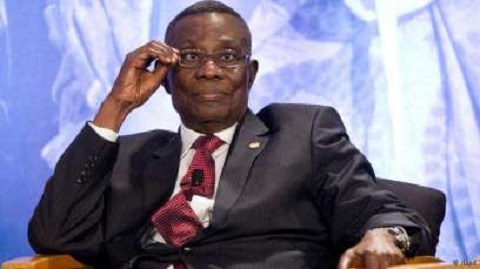
"There is hope for Africa," Dr. John Evans Atta Mills declared Monday in a speech to hundreds of students and faculty at Claflin University in Orangeburg.
"There are all sorts of difficult problems confronting Africa" but "there is a wind of change that's blowing across Africa," said Mills, whose appearance was part of the university's Windows to the World series.
The series is "designed to bring the global community to our village," said Dr. Howard Hill, vice president for academic affairs.
Hill said the series helps fulfill Claflin President Henry Tisdale's "vision of exposing the university to the diverse social and cultural traditions of humanity."
Mills appeared pleasantly surprised when Claflin sophomore Ernest Bervell Mensah gave the invocation in a Ghanaian language.
Mills was vice president of Ghana from 1997 to 2000. Those were the last three years of Jerry Rawlings' 19-year domination of politics in that West African country.
Rawlings retired as president in 2000 and endorsed Mills as his successor, but Mills lost that election. Mills intends to make another run for the presidency next year.
Poor Africa: Despite its glorious past, today half of its people live on less than $1 a day, and 33 of the world's 48 least developed nations are found on that continent, Mills said.
"What has gone wrong?" the former law professor asked, then offered his own answers.
-- Colonialism "left Africa with weak states" that were never able to achieve political and economic strength.
-- During the Cold War, "Africa was torn between the two superpowers, the United States and the Soviet Union. ... Some of our leaders were taught how to be corrupt." Secret Swiss bank accounts were opened. The times and situations bred rebel movements.
-- Globalization has concentrated money and power in the hands of a few. "Twelve percent of the world's population controls 85 percent of the world's resources," Mills said. "The rich are getting richer, and the poor are getting poorer. The gap is widening."
For too long, Mills said, African leaders stopped the list right there, blaming others for their misfortune but never acknowledging their own "poor leadership, corruption and bad governance."
Various African leaders have muzzled the news media, exploited ethnic and tribal conflict, intimidated the courts and disrespected the rights of minorities, he said.
That is changing. African leaders are "admitting, for the first time, they are part of Africa's problems," Mills said. "For once, Africa's leaders are holding themselves accountable."
That includes Mills himself.
During a brief question time, Dr. Arthur Kennedy, chief executive officer of Family Health Centers, based in Orangeburg, said he is a native of Ghana and twice was a United Nations refugee.
Politely but firmly, Kennedy asked Mills about his personal decision to serve in a government which committed "horrendous human rights abuses."
Mills replied he was not involved in the coup which brought Rawlings to power and was "not even in the country" at the time of the 1979 insurrection.
Furthermore, as an attorney, Mills said he defended, without charging a fee, clients who felt they were wronged by the government in power.
But he acknowledged the government in which he served had its failings. "We were not always the best judges of human character," he said.
He cited the tendency of leaders to allow themselves to be surrounded by sycophants who tell them what they want to hear when the truth is less pleasant.
Mills said he has learned from his mistakes. "I want to chart a new course," he said.
"We in Africa have become so aid-dependent," Mills said. Governments have been known to grab the chance to obtain a huge loan before even deciding how to use the money.
Africa won't advance by allowing itself to continue to be "spoon-fed," Mills said. "The development of Africa is the primary responsibility of the Africans themselves. We expect to lift ourselves by our bootstraps."
"We are not asking to be given fish to eat. We are asking to be taught to fish."
"It is only through trade, not handouts, that we will improve as a nation," said Mills, who added that one goal of his trip to South Carolina is to explore business partnerships.
With 800 million people -- three times the population of the United States -- Africa ought to be an attractive trading partner. But political instability frightens away many potential investors, he said.
And there are other economic problems. While Africa is rich in natural resources, its nations have little control over the prices they fetch on the world market. And Africans "have too big an appetite for imports from our colonial masters," which tips the balance of trade.
While calling for more balanced trade, Mills said he would still maintain his international perspective as president.
"Xenophobia has done no country any good," he said. "We need to learn from each other" through "mutually beneficial business links" and cultural opportunities such as student exchanges with Claflin University.
"Education should be the cornerstone for all we do. Education is the saw that cuts through all obstacles," said Mills, who has taught on three continents over 25 years, including a stint as a Fulbright Scholar at Stanford University Law School.
He once returned to his undergraduate alma mater, the University of Ghana, during the middle of some political discord and saw a message spray-painted on a wall: "Let the blood flow."
He was horrified because youths "are the future leaders of the world" and he wants to give them an entirely different message.
"History is your guide. Learn from history," he implored. "Don't copy the bad habits of your elders. Learn from us -- but use only the best practices."
Thanking Mills for his remarks, Tisdale said, "We are indeed preparing leaders," and a vital part of that preparation is to show students that "there's a bigger world out there."